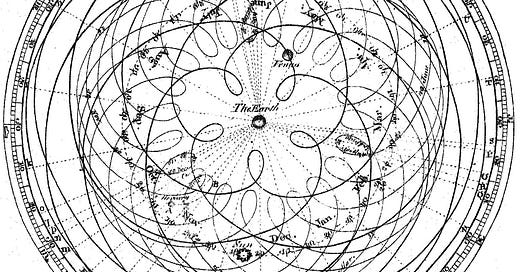Kyborg 14: GCB3
Making Sense of Sense
I am taking half a step back to connect what we have been doing with the Great Chain of Being and Attentional Communities with the original question that inaugurated the Kyborg series (this post). I said wanted to address the issue of intelligibility, i.e.,
why does the world make sense?
We take it as a given that the world makes sense, that every time you open your eyes there’s a world of familiar forms all the way to the horizon. Even scientists who question the physical structure of reality (for example, they might tell us that the earth goes around the sun instead of the sun going around the earth) take the intelligibility of the world for granted - they trust the world to reveal it’s real structure, so that careful observation will tell us the earth goes around the sun.
One step beyond the scientist is the epistemologist, the philosopher who asks about the credibility of our systems of knowledge. And that leads to subtle theories of inference. But the intelligibility question can’t be solved at the level of epistemology: it’s not asking when can we be confident about what we know, when can we be sure the smoke on top of the hill is due to fire and not a stray cloud, that the rope is a rope and not a snake. So let me state a refined version of the question at the top of this essay:
The fundamental question of intelligibility: why is the world intelligible at all?
One radical perspective on that question is the Cartesian, skeptical stance, which doubts the intelligibility of the world until a bedrock intelligibility is reached which can’t be doubted without collapsing into incoherence: that’s the intelligibility of consciousness according to Descartes.
We don’t have to agree with Descartes method or his conclusions, but it’s clear he was dipping his toes into a stream of inquiry, one that placed sense-making and intelligibility at the core. So much so that A.W. Moore in his “Evolution of Modern Metaphysics,” i.e., the history of the tradition that begins with Descartes, defines Metaphysics so:
Cognition, as the bearer of sense, performs a metaphysical function.
Making Sense of the GCB
Now that we have elevated sense-making to a leading role in our story of the world, what happens when we transplant this new criterion backwards in time, on the older tradition that Descartes and company disparaged?
In fact, what it shows (to me, at the very least) is that the GCB is eminently reasonable, a picture that renders the universe intelligible. In the GCB, revelation and reason work hand in hand to show that the universe emanates from the divine and is intelligible to us precisely because we are the chosen species.
That’s why the cosmos was arranged around the earth, with the Sun and the other planets revolving around it, and the earth itself and its bounty was given to humans. The planets revolve around the earth, the earth (metaphorically) revolves around us and we revolve around God.
That’s of course, the metaphysical version of Ptolemaic epicycles.
Ironically, the older metaphysical framework that took intelligibility for granted, actually made more sense than the newer one in which intelligibility became an urgent question. It’s troubling in the extreme that the natural progress of science refutes every notions of intelligibility - it’s bad enough when gravity showed that action at a distance is the norm, but quantum mechanics makes the situation even worse.





